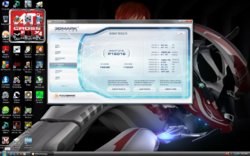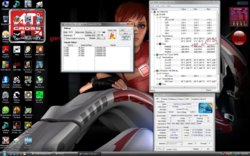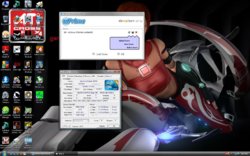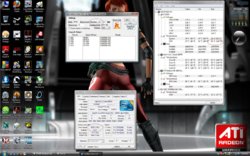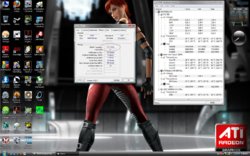- Joined
- Aug 30, 2006
- Messages
- 7,256 (1.05/day)
| System Name | ICE-QUAD // ICE-CRUNCH |
|---|---|
| Processor | Q6600 // 2x Xeon 5472 |
| Memory | 2GB DDR // 8GB FB-DIMM |
| Video Card(s) | HD3850-AGP // FireGL 3400 |
| Display(s) | 2 x Samsung 204Ts = 3200x1200 |
| Audio Device(s) | Audigy 2 |
| Software | Windows Server 2003 R2 as a Workstation now migrated to W10 with regrets. |
2cm...
Your OP question was about memory speed. OC your memory or getting tighter timings makes VERY LITTLE DIFFERENCE in real life, or in benchmarks, except synthetic memory benchmarks speeds. Getting your memory as hot as a spicy vindaloo is unlikely to make any real world noticable benefits to your setup.
The primary bottleneck in gaming is GPU. Then CPU. Then memory. And possibly HDD before memory. The bread and butter of gaming is doing AI, calculating coordinates, and throwing them at the GPU. Mixed in with a salty sprinkling of getting data off the HDD. Therefore the cherry on the cake is to get optimum GPU performance. A better GPU, or OC your GPU, is where the gravy is. OC your memory might win you 1-2%. OC your GPU or CPU might win you 10-20%.
The primary bottleneck in desktop use is CPU. Then HDD. Then memory. Then GPU. The sausages and mashed potatoes of desktop use is getting data and crunching it. OC your memory might win your 1-2%. OC your CPU might win you 10-20%. Going from HDD to SSD will make your desktop snappier 100% of the time.
Very rarely is the bottleneck memory, because only a few specialist activities require the constant movement of massive amounts of memory data.
For the budget you are prepared to spend... I would recommend a SSD. You will get a lot more sweet vanilla pudding out of a snappier desktop, booting time, and map loading times, than upgrading your memory.
Remember in gaming the target is NOT increasing max FPS, but increasing min FPS. That is where the "lag" and "latencies" are. Minimum FPS is absolutely not contrained by memory speeds. The creme Anglais of game tweaking is therefore raising those min FPS's, which more often than not, are hit due to loading assets off the disk... and THAT is where the SSD will come in handy.
Your OP question was about memory speed. OC your memory or getting tighter timings makes VERY LITTLE DIFFERENCE in real life, or in benchmarks, except synthetic memory benchmarks speeds. Getting your memory as hot as a spicy vindaloo is unlikely to make any real world noticable benefits to your setup.
The primary bottleneck in gaming is GPU. Then CPU. Then memory. And possibly HDD before memory. The bread and butter of gaming is doing AI, calculating coordinates, and throwing them at the GPU. Mixed in with a salty sprinkling of getting data off the HDD. Therefore the cherry on the cake is to get optimum GPU performance. A better GPU, or OC your GPU, is where the gravy is. OC your memory might win you 1-2%. OC your GPU or CPU might win you 10-20%.
The primary bottleneck in desktop use is CPU. Then HDD. Then memory. Then GPU. The sausages and mashed potatoes of desktop use is getting data and crunching it. OC your memory might win your 1-2%. OC your CPU might win you 10-20%. Going from HDD to SSD will make your desktop snappier 100% of the time.
Very rarely is the bottleneck memory, because only a few specialist activities require the constant movement of massive amounts of memory data.
For the budget you are prepared to spend... I would recommend a SSD. You will get a lot more sweet vanilla pudding out of a snappier desktop, booting time, and map loading times, than upgrading your memory.
Remember in gaming the target is NOT increasing max FPS, but increasing min FPS. That is where the "lag" and "latencies" are. Minimum FPS is absolutely not contrained by memory speeds. The creme Anglais of game tweaking is therefore raising those min FPS's, which more often than not, are hit due to loading assets off the disk... and THAT is where the SSD will come in handy.







